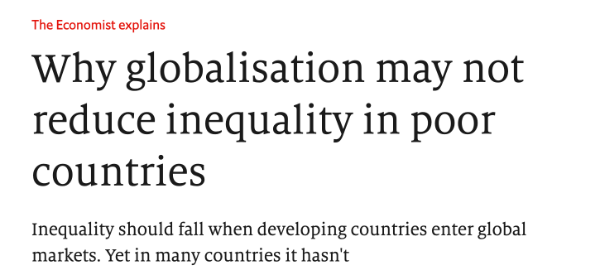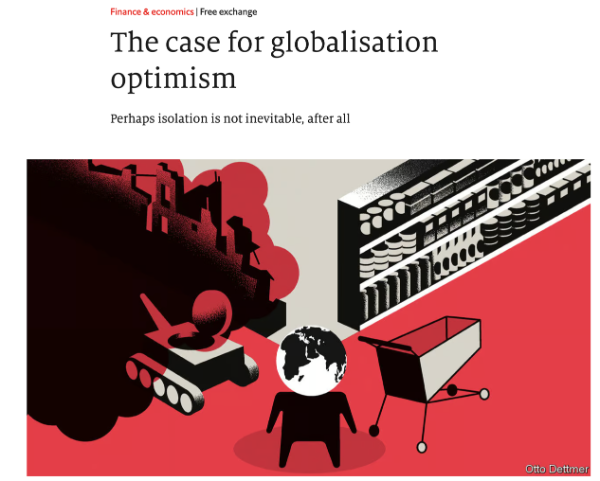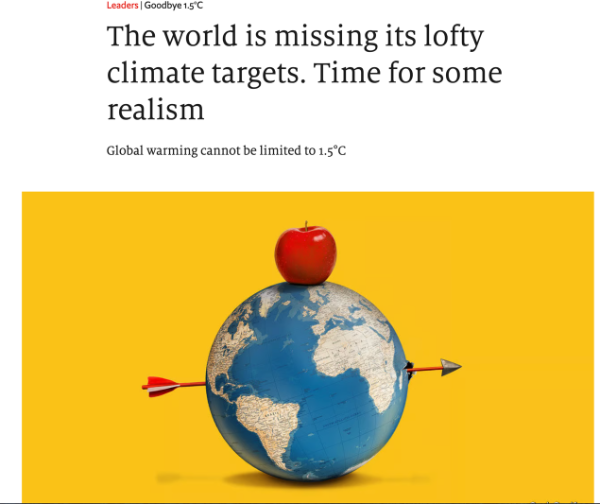雅思写作备考是有迹可循的,一般来说,可以把雅思写作分为若干个话题,而且这些话题离不开语料内容的支撑,下面新航道重庆学校雅思教研组老师给大家带来的备考干货-雅思写作备考语料之国际类话题,详情如下所示。

一、全球化 – 与经济相关
相关考题:
Some people believe that giving aid to poorer countries has more negative effects than the positive effects.
To what extent do you agree or disagree?
Rich countries often give financial aid to poor countries, but it does not solve the poverty. So rich countries should give other types of help to the poor countries rather than the financial aid. To what extent do you agree or disagree?
语料来源:https://www.economist.com/the-economist-explains/2014/09/02/why-globalisation-may-not-reduce-inequality-in-poor-countries

GLOBALISATION has made the planet more equal. As communication gets cheaper and transport gets faster, developing countries have closed the gap with their rich-world counterparts. But within many developing economies, the story is less rosy: inequality has worsened. The Gini index is one measure of inequality, based on a score between zero and one. A Gini index of one means a country’s entire income goes to one person; a score of zero means the spoils are equally divided. Sub-Saharan Africa saw its Gini index rise by 9% between 1993 and 2008. China’s score soared by 34% over twenty years. Only in a few places has it fallen. Does globalization have anything to do with it?
Usually, economists say no. Basic theory predicts that inequality falls when developing countries enter global markets. The theory of comparative advantage is found in every introductory textbook. It says that poor countries produce goods requiring large amounts of unskilled labor. Rich countries focus on things requiring skilled workers. Thailand is a big rice exporter, for example, while America is the world's largest exporter of financial services. As global trade increases, the theory says, unskilled workers in poor countries are high in demand; skilled workers in those same countries are less coveted. With more employers clamoring for their services, unskilled workers in developing countries get wage boosts, whereas their skilled counterparts don’t. The result is that inequality falls.
中文翻译: 贫穷国家生产的商品需要大量非熟练劳动力,而富裕国家则专注于需要熟练工人的事物。例如,泰国是大米出口国,而美国则是世界上比较大的金融服务出口国。理论认为,随着全球贸易的增加,将会需要大量的来自贫穷国家的非熟练劳动力,而这些国家的熟练劳动力则不太被青睐。由于越来越多的雇主竞相争取他们的服务,发展中国家的非熟练劳动力得到了工资提升,而熟练劳动力则没有。结果是不平等程度下降。
这个段落不仅可以学习词汇表达,还可以借鉴其如何展开说明的
large amounts of unskilled labor
focus on things requiring skilled workers
are high in demand
are less coveted
clamoring for their services
get wage boosts
But the high inequality seen today in poor countries is prompting new theories. One emphasizes outsourcing—when rich countries shift parts of the production process to poor countries. Contrary to popular belief, multinationals in poor countries often employ skilled workers and pay high wages. One study showed that workers in foreign-owned and subcontracting clothing and footwear factories in Vietnam rank in the top 20% of the country's population by household expenditure. A report from the OECD found that average wages paid by foreign multinationals are 40% higher than wages paid by local firms. What is more, those skilled workers often get to work with managers from rich countries, or might have to meet the deadlines of an efficient rich-world company. That may boost their productivity. Higher productivity means they can demand even higher wages. By contrast, unskilled workers, or poor ones in rural areas, tend not to have such opportunities. Their productivity does not rise. For these reasons globalization can boost the wages of skilled workers, while crimping those of the unskilled. The result is that inequality rises.
中文翻译: 其中一种理论强调外包--即富裕国家将生产过程的一部分转移到贫穷国家。与普遍观念相反,贫穷国家的跨国公司往往雇用熟练工人,并支付高薪水
生产力高意味着他们可以要求更高的工资。相比之下,非熟练劳动者或农村贫困人口往往没有这样的机会。因此,全球化可以提高熟练工人的工资,而打压非熟练者的工资。结果是不平等程度上升。
Shift ___ to ___
Contrary to
Boost their productivity
Boost the wages
Crimp the wages
二、全球化 – 与科技相关
考题相关:
Some people think governments should introduce new technology to improve the lives in developing countries while others think they should provide free education to achieve that.
Discuss both views and give your own opinion.
Technology makes our life too rich and some people say that we should live a simple life without technology.
To what extent do you agree or disagree?
语料来源:https://www.economist.com/finance-and-economics/2023/02/16/the-case-for-globalisation-optimism

The world has experience with cold war, but not between countries as economically intertwined as America and China. In a suspicious atmosphere, accidents happen. The habit of protecting and subsidizing domestic firms—as both countries are now doing on a gargantuan scale—may prove difficult to break. All this means globalization’s immediate prospects appear bleak. But looking on the bright side, as Keynes did, is a helpful reminder of the ways in which events often end up going better than expected. Where globalization is concerned, demography, technological progress and the example of history itself could push the world in the direction of more, rather than less, integration. Globalization’s prospects are brighter than most now appreciate.
Start with demographic change. History suggests that trade policy responds to the relative scarcity or abundance of factors of production, like labor. In the 19th century, countries with lots of land but few workers, like America and Australia, subsidized immigration. But as economic integration narrowed price and wage gaps across countries, and workers in once labor-scarce economies grew angry at slow pay growth, governments began erecting barriers to goods and people. Recent experience tells a similar story. Exposure to imports from labor-rich economies like China fueled anti-trade sentiment. Americans have elected successive protectionist presidents after years of labor-market weakness, in which too many workers competed for too little work.
Recently, though, the situation has begun to change. Unemployment rates are low across much of the rich world, and investment programmes intended to reshore production may further boost demand for workers, even as labour forces grow more slowly or shrink. Although robots may eventually help plug workforce gaps, rich countries looking to expand production will need to welcome foreign workers, or source goods and components through supply chains which tap abundant labor supplies in other economies. Either would deepen cross-border ties.
话题相关表达:
填补劳动力缺口: plug workforce gaps
利用其它国家的丰富的劳动力资源:tap abundant labor supplies in other countries
加深跨境联系:deepen cross-border ties
在阅读下一段之前,请尝试先把以下中文翻译成英语:
技术变革是另一个令人乐观的原因。在19世纪,铁路和电报的出现大幅降低了运输和通信0,并且至少与关税壁垒的削减一样有助于经济一体化。在过去的半个世纪中,信息技术和集装箱运输帮助实现了全球供应链的爆炸式增长
Technological change is another cause for optimism. In the 19th century, railways and telegraphs brought a sharp decline in transport and communication costs, and were at least as responsible for economic integration as cuts to tariff barriers. Over the past half-century, information technology and container shipping helped make the explosive growth of global supply chains possible. Today, privacy and national-security concerns have led to some balkanisation of digital-information flows. One might suppose governments will be more protective still of powerful new ai.
考虑一下以下中文用英语怎么写:
科技促进贸易发展
远程工作已经降低了跨境服务的0
降低不同语言国家之间的商品和服务贸易0
人工智能的经济效应难以0
人工智能推动的经济繁荣
But technology will facilitate trade in other ways. The transition to renewable energy sources will create new patterns of resource scarcity and abundance. Remote-work technologies have already reduced the cost of providing services across borders. In a context of labor scarcity, this sort of trade is likely to increase, whether or not domestic working arrangements return to patterns last seen before covid-19. In addition, continued improvements in machine translation and speech recognition will reduce the cost of trade in both goods and services among countries that speak different languages. Although the macroeconomic effects of progress in ai are difficult to predict, an ai-powered economic boom would probably be associated with large global flows of investment and capital goods. If productivity were to surge in the economies of ai leaders like America, such places might become more eager to export and more open to measures which liberalize trade.
Optimism is warranted, above all, because we learn from the past. The macroeconomic shocks in 2007-09 and 2020 could easily have sparked depressions, but did not because policymakers understood how to avoid the gravest errors of the 1930s. Covid took an awful toll, but advances in public health and medicine helped ensure that the pandemic was less deadly than the Spanish flu, in a world far more populous and connected than that of 1918. And whereas the leaders of a century ago could not anticipate the terrible cost of the detour taken in August 1914, those today are well aware of it. History will be different as a result.
三、全球化 --- 与环境相关
考题相关:
The environment problem in the world cannot be solved by ordinary people, and governments and large companies should be responsible for this problem. To what extent do you agree or disagree?
The exploration and development of safe alternatives to fossil fuels should be the most important global priority today. To what extent do you agree or disagree?
语料来源:https://www.economist.com/leaders/2022/11/03/the-world-is-missing-its-lofty-climate-targets-time-for-some-realism

气候变化带来的危害:
The consequences of the world’s failure to curb emissions are catastrophic, and not just for coral atolls in the Pacific. Climate-related disasters are proliferating, from Pakistan, much of which was inundated by this summer’s unusually intense monsoon, to Florida, which in September endured its deadliest hurricane since 1935. Even less lethal distortions of the weather, such as this summer’s extraordinary heatwave in Europe, do enormous economic damage, impeding transport, wrecking infrastructure and sapping productivity.
控制温室气体排放: curb emissions of greenhouse gases
灾害激增:disasters are proliferating
阻碍交通: impede transport
破坏设施: wreck infrastructure
降低效率: sap productivity
The response to all this should be a dose of realism. Many activists are reluctant to admit that 1.5°C is a lost cause. But failing to do so prolongs the mistakes made in Paris, where the world’s governments adopted a Herculean goal without any plausible plan for reaching it. The delegates gathering in Egypt should be chastened by failure, not lulled by false hope. They need to be more pragmatic, and face up to some hard truths.
全球国家如何应对气候变化:
First, cutting emissions will require much more money. Roughly speaking, global investment in clean energy needs to triple from today’s $1trn a year, and be concentrated in developing countries, which generate most of today’s emissions. Solar and wind power can be cheaper to build and run than more polluting types, but grids need to be rebuilt to cope with the intermittency of the sun and the wind. Concessionary lending and aid from rich countries are essential and a moral imperative. However, the sums required are far greater than what might plausibly be squeezed out of Western donors or multilateral organizations such as the World Bank.
减少排放cut emissions
优惠贷款 Concessionary lending
道德上的必须 a moral imperative
So the governments of developing countries, especially middle-income ones, will have to work with the rich world to mobilize private investment. On the part of developing countries, that will involve big improvements to the investment climate and an acceptance that they will have to cede some control over energy policy. On the part of donors, it will involve focusing spending on schemes that “crowd in” private capital, such as indemnifying investors against political and regulatory risks, taking equity stakes in private projects and agreeing to absorb the first tranche of losses if things go wrong. They will have to do things they dislike, such as helping the poorest countries shut coal plants. But without give on both sides, the world will bake.
The second hard truth is that fossil fuels will not be abandoned overnight. Europe is scrambling to build import facilities for natural gas, having lost access to Russian supplies, precisely because it cannot come up with any immediate alternative. For some poorer countries investments in gas, in conjunction with renewables, are still necessary: helping more citizens get life-enhancing electricity is a moral imperative, too.
The third truth is that because 1.5°C will be missed, greater efforts must be made to adapt to climate change. Adaptation has always been the neglected step-child of climate policy, mistrusted by activists as a distraction from cutting emissions or, worse, an excuse not to make any cuts. But no matter what, the world now faces more floods, droughts, storms and wildfires. For developing countries especially, but also for rich ones, preparing for these calamities is a matter of life and death.
Fortunately, as our special report argues, a lot of adaptation is affordable. It can be as simple as providing farmers with hardier strains of crops and getting cyclone warnings to people in harm’s way. Better still, such measures tend to have additional benefits beyond helping people cope with climate change. This is an area where even modest help from rich countries can have a big impact. Yet they are not coughing up the money they have promised to help the poorest ones adapt. That is unfair: why should poor farmers in Africa, who have done almost nothing to make the climate change, be abandoned to suffer as it does? If the rich world allows global warming to ravage already fragile countries, it will inevitably end up paying a price in food shortages and proliferating refugees.
适应气候变化 adapt to climate change
适应一直是气候政策中被忽视的步骤 Adaptation has always been the neglected step-child of climate policy
生死攸关 a matter of life and death
可负担的 affordable
来自富裕国家的适度援助也能产生巨大影响 This is an area where even modest help from rich countries can have a big impact.
上述就是重庆新航道雅思教研老师关于“雅思写作备考语料之国际类话题”的内容整理,更多雅思备考欢迎持续关注新航道重庆学校网站。